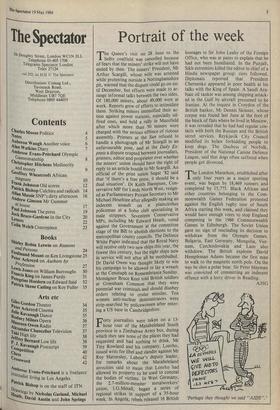Portrait of the week
The Queen's visit on 28 June to the Selby coalfield was cancelled because of fears that the miners' strike will not have ended by then. The miners' President, Mr Arthur Scargill, whose wife was arrested while protesting outside a Nottinghamshire pit, warned that the dispute could go on un- til December, but efforts were made to ar- range informal talks between the two sides. Of 180,000 miners, about 49,000 were at work. Reports grew of efforts to intimidate them. Striking miners intensified their ac- tion against power stations, especially oil- fired ones, and held a rally in Mansfield after which more than 50 miners were charged with the serious offence of riotous assembly. Printers at the Sun refused to handle a photograph of Mr Scargill in an unfavourable pose, and at the Daily Ex- press a dispute erupted between journalists, printers, editor and proprietor over whether the miners' union should have the right of reply to an article hostile to Mr Scargill. An official of the print union Sogat '82 said that 9f there's a free press, it should be a dual situation'. Dr Keith Hampson, Con- servative MP for Leeds North West, resign- ed as Parliamentary Private Secretary to Mr Michael Heseltine after allegedly making an indecent assault on a plainclothes policeman at a Soho club specialising in male strippers. Seventeen Conservative MPs, including Mr Edward Heath, voted against the Government at the committee stage of the Bill to abolish elections to the metropolitan county councils. The Defence White Paper indicated that the Royal Navy will receive only two new ships this year, the fewest this century, but the eight ships now in service will not after all be mothballed. Dr David Owen was thought likely to win his campaign to be allowed to lay a wreath at the Cenotaph on Remembrance Sunday. Monsignor Bruce Kent told British soldiers at Greenham Common that they were potential war criminals and should disobey orders relating to cruise missiles. Ten women anti-nuclear demonstrators were strip-searched by policewomen after enter- ing a US base in Cambridgeshire.
'Uorty journalists were taken on a 13- I: hour tour of the Matabeleland South province in a Zimbabwe Army bus, during which they saw none of the places they had requested and had nothing to drink. Mr Tiny Rowland and his company, Lonrho, issued writs for libel and slander against Mr Roy Hattersley, Labour's deputy leader, for remarks about the Matabeleland atrocities said to mean that Lonrho had allowed its property to be used to conceal the bodies of victims. In West Germany, the 2.7-million-member metalworkers' union, I.G.Metall, began a series of regional strikes in support of a 35-hour week. In Angola, rebels released 16 British
hostages to Sir John Leahy of the Foreign Office, who was at pains to explain that he had not been humiliated. In the Punjab, Sikh extremists killed the editor in chief of a Hindu newspaper group: riots followed. Diplomats reported that President Chernenko appeared in poor health at his talks with the King of Spain. A Saudi Ara- bian oil tanker was among shipping attack- ed in the Gulf by aircraft presumed to be Iranian. At the inquest in Croydon of the British banker, Mr Dennis Skinner, whose corpse was found last June at the foot of the block of flats where he lived in Moscow, it was revealed that he had had regular con- tacts with both the Russian and the British secret services. Reykjavik City Council modified its bylaw forbidding people to keep dogs. The Duchess of Norfolk, President of the National Canine Defence League, said that dogs often suffered when people got divorced.
The London Marathon, established after only four years as a major sporting event, was begun by 18,469 runners and completed by 15,775. Black African and other countries belonging to the Com- monwealth Games Federation protested against the English rugby tour of South Africa starting this week, and claimed they would have enough votes to stop England competing in the 1986 Commonwealth Games in Edinburgh. The Soviet Union gave no sign of rescinding its decision to withdraw from the Olympic Games. Bulgaria, East Germany, Mongolia, Viet- nam, Czechoslovakia and Laos also withdrew. The British explorer David Hempleman Adams became the first man to walk to the magnetic north pole. On the way he shot a polar bear. Sir Peter Hayman was convicted of committing an indecent offence with a lorry driver in Reading.
AJSG `Perhaps they thought we said "AIDS".'














































 Previous page
Previous page